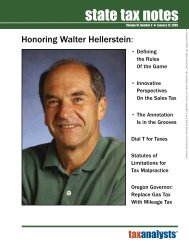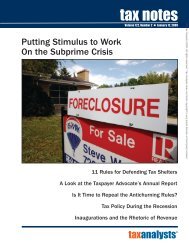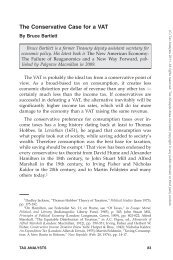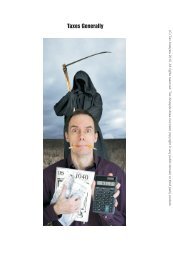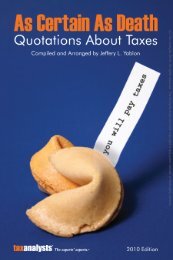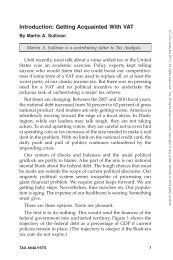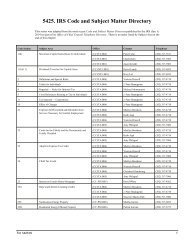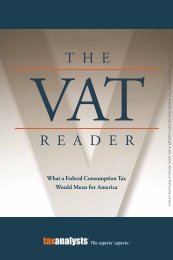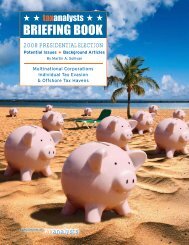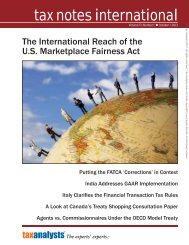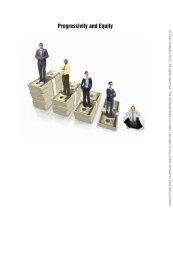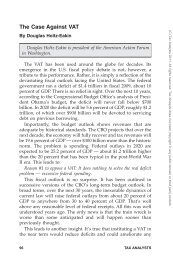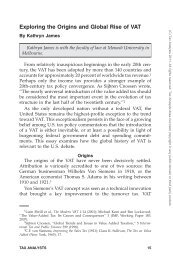Forty Years of Change, One Constant: Tax Analysts
Forty Years of Change, One Constant: Tax Analysts
Forty Years of Change, One Constant: Tax Analysts
Create successful ePaper yourself
Turn your PDF publications into a flip-book with our unique Google optimized e-Paper software.
<strong>Forty</strong> <strong>Years</strong> <strong>of</strong> <strong>Change</strong>, <strong>One</strong> <strong>Constant</strong>: <strong>Tax</strong> <strong>Analysts</strong><br />
Trevor Johnson<br />
Yorkshire, U.K.<br />
<strong>Forty</strong> years ago I was a lowly member <strong>of</strong><br />
the U.K. Inland Revenue working in a provincial<br />
<strong>of</strong>fice. It was the last century in more ways than<br />
one. The <strong>of</strong>fice would be unrecognizable to today’s<br />
staff. All the work was carried out manually and<br />
recorded on paper without the aid <strong>of</strong> electronic<br />
calculators. True, we had charts printed on cards<br />
which gave us the tax due on various amounts <strong>of</strong><br />
income, but <strong>of</strong>ten we had to perform calculations<br />
using brainpower, which has long since been abandoned<br />
in the modern HM Revenue & Customs.<br />
In those days married women were not recognised<br />
by the tax system. Indeed at one stage they<br />
were classed as “incapacitated persons” along with<br />
“any infant, person <strong>of</strong> unsound mind, lunatic, idiot<br />
or insane person.” A wife’s income was aggregated<br />
with that <strong>of</strong> her husband and assessed to tax on<br />
him. This could lead to difficulties where the<br />
Revenue were aware <strong>of</strong> a wife’s interest-producing<br />
bank deposit <strong>of</strong> which the husband was in ignorance!<br />
How could he declare the interest if she had kept<br />
the account secret, and how could the Revenue tell<br />
him without creating marital difficulties? It was<br />
only 20 years ago that this anachronistic system<br />
was replaced by what was then termed “independent<br />
taxation,” where each spouse was responsible for<br />
their own tax affairs and each had their own personal<br />
allowance and lower tax rate bands.<br />
While independent taxation was a major change<br />
in the U.K. tax system, by far the most revolutionary<br />
change was the introduction <strong>of</strong> self-assessment in<br />
1996. For nearly 200 years U.K. taxpayers were<br />
not required to pay any tax directly until they<br />
received a demand notice. Suddenly they were<br />
expected to take the initiative and pay tax without<br />
being prompted by the government. This was a<br />
tremendous culture shock for many people. They<br />
still expected to receive a demand, and as a result<br />
incurred late payment charges.<br />
Another aspect <strong>of</strong> self-assessment which took<br />
some time to get used to was that fact that, other<br />
than in cases selected for enquiry, the Revenue did<br />
not formally agree or even comment on a taxpayer’s<br />
liability for the year. This led to uncertainty as to<br />
whether the return had been accepted as correct or<br />
whether it might be challenged in the near future.<br />
It also put the onus on the taxpayer to ensure the<br />
return was correct. Under the old regime you could<br />
send in your return and accounts, the tax inspector<br />
would write back with a list <strong>of</strong> queries to which<br />
you would respond, and most times you would end<br />
up with an agreed liability which was not likely to<br />
be reopened in the future. It was obviously labourintensive,<br />
but it worked reasonably well and<br />
provided certainty.<br />
Self-assessment brought with it a system <strong>of</strong><br />
automatic penalties and interest charges for late<br />
filing <strong>of</strong> returns and payment <strong>of</strong> tax. This also took<br />
some people by surprise. Previously, if a penalty<br />
was charged it meant that someone had done<br />
something wrong. Hence when an automatic late<br />
filing penalty was charged, it seems that nearly<br />
everyone lodged an appeal. I was sitting as an<br />
appeal commissioner at the time, and we were inundated<br />
with such appeals, none <strong>of</strong> which had any<br />
chance <strong>of</strong> success. It struck me that fewer appeals<br />
would have been made if, instead <strong>of</strong> being called a<br />
penalty, it had been described as a late filing fee.<br />
It is now 14 years since the introduction <strong>of</strong><br />
self-assessment in the U.K., and I think we are<br />
now over those initial problems, or at least we now<br />
understand what is involved and what is expected<br />
<strong>of</strong> us. Its introduction has enabled HMRC to reduce<br />
its manpower and presumably the cost <strong>of</strong> tax<br />
collection. However, current anecdotal evidence<br />
suggests that the pendulum has swung too far the<br />
other way and that HMRC may no longer be fit for<br />
purpose.<br />
Kenneth J. Kies<br />
Federal Policy Group<br />
Washington<br />
Without a doubt the single most significant<br />
change in tax policy in the history <strong>of</strong> the U.S.<br />
income tax code was the decision to index for inflation<br />
the minimum and maximum dollar amounts for<br />
the marginal rate brackets and the personal exemption<br />
as provided in the Economic Recovery <strong>Tax</strong> Act<br />
<strong>of</strong> 1981 (ERTA).<br />
With one single provision, Congress ended<br />
the annual ritual doling out <strong>of</strong> condolences made<br />
possible by bracket creep’s ever deeper grasp into<br />
Americans’ pockets. And just as surely as Major<br />
League Baseball’s crackdown on steroids has<br />
tipped the balance <strong>of</strong> the game away from the hitter<br />
and back to the pitchers and fielders, so has indexing<br />
tipped the balance away from the taxwriting<br />
committees — and their chairmen in particular —<br />
and back to the taxpayer.<br />
There is a reason why the chairmen <strong>of</strong> the last<br />
quarter-century have not seemed to measure up<br />
to the Wilbur Mills and Russell Longs <strong>of</strong> years<br />
gone by. That reason is $45 billion: the amount<br />
15



